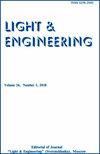Applied Photometry: Review of Retrospective and Reality Part 1: Candela and Watt, from Incandescent Lamp to LED
IF 0.3
4区 工程技术
Q4 ENGINEERING, ELECTRICAL & ELECTRONIC
引用次数: 0
Abstract
Photometry is the science of measuring light, which began with a visual comparison of the light of stars, the moon, and the sun with the light of a candle. Today it is a part of optical radiometry, inextricably linked with physical radiation detectors, taking into account the fact that light is actinic radiation, and physical detectors must be actinic in the case of integral measurements. At the same time, optical radiometry has introduced and introducing new technologies into spectral radiometric measurement methods, which, in turn, make it possible to solve the problems of measuring the parameters of actinic radiation by objective physical methods of spectral radiometry, taking into account the weight functions of actinic radiation. The choice between integral and spectral methods is determined by: – The required accuracy of the measurement task to be solved; – Knowledge of the weight functions of actinic radiation; – The quality of correction of radiation receivers for the weight functions of actinic radiation; – Methods for calibrating radiation receivers; – Actinic coefficients of optical radiation receivers (correction coefficients) and the accuracy of their determination; – Technical capabilities of spectral equipment; – Methods and means of spectrometers calibration; – Software for spectral measuring instruments, – Comparative analysis of the accuracy (uncertainty) of measurements by the spectral and integral methods in each individual case. The replacement of traditional sources of general lighting and signaling by radiation sources with LEDs, which have a spectral distribution of light emitting characteristics different from traditional light sources, has raised a number of issues in the metrological support of optical radiometry and applied photometry related to the oneness of the reproduction of units of energy and photometric quantities based on Watt.应用光度学:回顾与现实第1部分:坎德拉和瓦特,从白炽灯到LED
测光学是一门测量光的科学,它开始于将星星、月亮和太阳的光与蜡烛的光进行视觉比较。今天,它是光学辐射测量的一部分,与物理辐射探测器有着千丝万缕的联系,考虑到光是光化辐射,而物理探测器在积分测量的情况下必须是光化的。同时,光学辐射计量学在光谱辐射测量方法中引入和引入了新的技术,从而解决了利用光谱辐射计量的客观物理方法,在考虑光化辐射权函数的情况下测量光化辐射参数的问题。在积分和光谱方法之间的选择取决于:-要解决的测量任务所需的精度;-了解光化辐射的权重函数;-辐射接收器校正光化辐射权函数的质量;-校准辐射接收器的方法;-光辐射接收器的光化系数(校正系数)及其测定的准确性;-频谱设备的技术能力;-光谱仪校准的方法和手段;-用于光谱测量仪器的软件,-在每种情况下用光谱和积分方法测量的精度(不确定度)的比较分析。用发光二极管(led)的辐射源取代传统的一般照明和信号源,其发光特性的光谱分布与传统光源不同,这在光学辐射计量学和应用光度学的计量支持方面提出了许多问题,这些问题与基于瓦特的能量单位和光度量的再现的统一性有关。
本文章由计算机程序翻译,如有差异,请以英文原文为准。
求助全文
约1分钟内获得全文
求助全文
来源期刊

Light & Engineering
ENGINEERING, ELECTRICAL & ELECTRONIC-OPTICS
CiteScore
1.00
自引率
50.00%
发文量
0
审稿时长
1 months
期刊介绍:
Our magazine
develops comprehensive communication within the lighting community, providing opportunities for discussion and free expression of opinions of specialists of different profiles;
contributes to the convergence of science and engineering practice, the search for opportunities for the application of research results in lighting and technological applications of light;
keeps the scientific community up to date with the latest advances in the theory of the light field, providing readers with operational professional information;
initiates international cooperation, promotes and distributes the results of Russian authors in the international professional community;
provides equal opportunities for authors from different regions of Russia and other countries.
The journal publishes articles in the following areas:
visual and non-visual effects of radiation on humans;
light field theory;
photometry and colorimetry;
sources of light;
ballasts;
light devices, their design and production technology;
lighting and irradiation installation;
light signaling;
methods of mathematical modeling of light devices and installations;
problems of energy saving in lighting, installation and operation of lighting installations;
modern production technologies of lighting products for lighting control systems;
innovative design solutions;
innovations in lighting and lighting design;
the study of the effect on plants and animals, problems of using light in medicine;
problems of disinfection of premises, water and smell elimination with the help of technology of UV radiation using;
problems of light in the ocean and space.
 求助内容:
求助内容: 应助结果提醒方式:
应助结果提醒方式:


